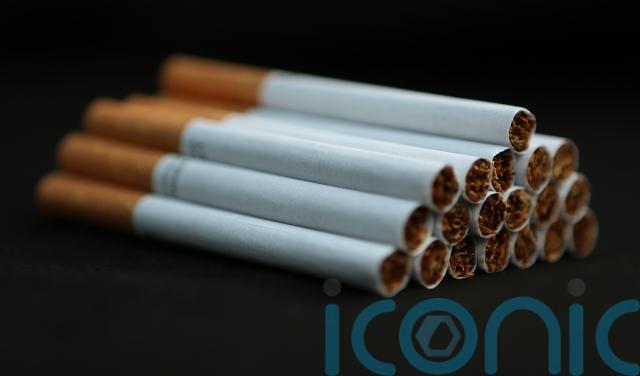
The Scottish Government has said it will “carefully consider” a report which suggests introducing a minimum price for tobacco has the potential to bring about “significant reductions in smoking rates”.
Smoking is linked to 16% of deaths in Scotland, and the report looked at the impact of introducing minimum pricing.
Government figures show 15% of adults were smokers in 2022, with the report indicating a minimum price of 60p per cigarette could reduce smoker numbers by an estimated 16,327.
It comes more than six years after the Scottish Government introduced minimum unit pricing for alcohol in May 2018 in a bid to tackle drink-related harm.
Modest estimates are that even a 60p minimum price would lead to 16,327 people stopping in the next ten years, plus 1,467 fewer hospital admissions, prevent 285 deaths, and add an additional 6,792 years of life to the Scottish population by 2034.https://t.co/ubjHSAeODy pic.twitter.com/uP6n5lD86W
— Public Health Scotland (@P_H_S_Official) October 29, 2024
The report on minimum pricing for tobacco, published by Public Health Scotland, considered the possible impact of prices ranging from 40p to 80p per cigarette.
It stressed that smoking is currently a “major contributor to health issues, premature death, and health inequalities” in Scotland.
The report added: “This burden is not evenly distributed across the population, with 25% of people in the most deprived areas smoking compared to 7% in the least deprived areas.”
Looking at a minimum price of 60p per cigarette, the research by the University of Sheffield found this “is predicted to avert 285 deaths” in the decade up to 2034.
It also said a minimum price set at this level could lead to “approximately 1,467 fewer hospital admissions by 2034”, with a saving of £2.7 million to the NHS.
A minimum price of 80p per cigarette – the equivalent of a 30% hike in excuse duty on tobacco – could mean 3,784 fewer hospital admissions by 2034 – saving almost £7 million.
With factory-produced cigarettes costing from “about 63p per stick”, the report said lower minimum prices of 40p and 50p would only impact hand-rolling tobacco.

It added: “Conservative estimates are that they would reduce the number of people who smoke by 4,297 and 10,312 and increase average spending on tobacco for people who continue to smoke by £2.51 and £5.20 per week from a baseline of £14.20.”
However it said even the highest minimum price modelled of 80p per cigarette could see Scotland struggle to achieve its target of being “tobacco free” by 2034.
For this to be met, the number of smokers would need to be less than 5% of the population, with the report saying an 80p minimum price is still projected to leave Scotland with a “smoking prevalence of 8.44%, short of the 5% target”.
However the report found minimum pricing for tobacco “may reduce smoking prevalence and improve public health in Scotland”.
It added: “A 60p minimum price would raise the price of all hand-rolling tobacco and the price of the cheapest factory-made cigarettes, resulting in an estimated 16,327 fewer people who smoke, and increase average spending for people who remain smoking of £7.21 per week.
“This would restrict the tobacco industry’s ability to keep low-cost products on the market, reducing the availability of cheaper options for people looking to switch to more affordable tobacco.”
New research by @sheffielduni commissioned by PHS has found that minimum pricing policies for tobacco could help reduce smoking prevalence and improve health in Scotland, especially among disadvantaged groups where smoking related harms are highest. https://t.co/ubjHSAeODy pic.twitter.com/i0ny2ToGef
— Public Health Scotland (@P_H_S_Official) October 29, 2024
Consultant at PHS Dr Garth Reid said: “Every year, smoking contributes to over 8,000 deaths and nearly 90,000 hospital admissions in Scotland.
“It’s one of the leading causes of ill health and early death that disproportionately affects those living in our most deprived communities.
“We know that tobacco price is a key factor in people starting and continuing to smoke. The findings of this research show that minimum pricing could have a real impact on reducing the number of people who smoke, in a relatively short period of time.”
Public health minister Jenni Minto said: “We will carefully consider the findings of this research into minimum pricing as part of our ongoing work within the tobacco and vaping framework.
“Smoking is a huge burden on our NHS and social care services and contributes significantly to health inequalities, which is why our goal is for a tobacco-free Scotland by 2034.”
Subscribe or register today to discover more from DonegalLive.ie
Buy the e-paper of the Donegal Democrat, Donegal People's Press, Donegal Post and Inish Times here for instant access to Donegal's premier news titles.
Keep up with the latest news from Donegal with our daily newsletter featuring the most important stories of the day delivered to your inbox every evening at 5pm.